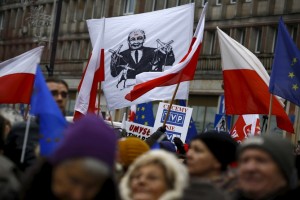Why everyone is giving Poland a hard time
Since coming into power at the end of October 2015, Poland’s new, right-wing government has caused a stir at home and drawn international criticism. Dr Kamil Zwolski, Lecturer in Global Politics & Policy, explores the situation.

Hardly a day passes at the moment without EU officials or European leaders questioning decisions made by the government.
In its analysis, Der Spiegel warns against Poland’s “creeping autocracy”. Some observers have even compared the situation in Poland to Putin’s Russia. While such comparisons are exaggerated, there are serious questions to ask about the Polish government’s commitment to the principles of liberal democracy.
Poland has been praised for years for its successful transition from communist state to liberal democracy. Now, it is the subject of criticism, worry and disappointment. What happened?
After eight years in power, the centre-right, pro-EU and relatively moderate Civic Platform government lost the 2015 presidential and parliamentary elections. In its place came the nationalistic, conservative and EU-sceptic Law and Justice (PiS) party, led by Jarosław Kaczyński, the twin brother of former president Lech Kaczyński, who died in a plane crash in 2010.
Changing the rules overnight
Things quickly changed after the election. Kaczyński appointed Beata Szydło as prime minister but it is clear that he pulls all the strings. For his part, president Andrzej Duda appears to be limited in his role to formally approving whatever the parliament (i.e. Kaczyński) throws his way.
Under the auspices of this peculiar administrative set up, the parliament has set about making drastic reforms at breakneck speed. Laws are changed overnight and without consultation. Critical voices are summarily ignored.
So far, the parliament has significantly curtailed the powers of the national constitutional tribunal, which is supposed to impose judicial checks on the government. Another law seeks to curtail the freedom of the press by allowing the government to appoint the heads of media organisations.
Next on the list is foreign policy. The government is still in the process of developing plans on this front but it is already facing a predicament. On one side, the new government dislikes Russia, and on the other, it is increasingly fed up with the EU. The two positions are not particularly compatible.
The bear or the overbearing?
Poland has traditionally been sceptical of Russian foreign policy. While Western European countries, notably Germany, have been forging political and economic links with post-Soviet Russia, Poland has been working hard to join NATO, the EU, and to nurse the independence of the post-Soviet republics.
The wars in Georgia and Ukraine have proved to Poland’s elites that their concern was justified. Under Putin, Russia’s neighbours would have to watch their borders.
However, Poland is strongest as part of a team. It relies on its more powerful EU partners on the international stage and would struggle alone. When introducing the proposal for the EU’s Eastern Partnership programme, Poland worked together with Sweden. In the Ukrainian conflict, Poland accepted the leadership role of Germany.
It is unclear whether the new government appreciates this. On one hand, the anti-Russian sentiment seems to run deeper than ever. This government seems to be more emotional and less pragmatic about the relationship than its predecessors. This is fuelled by the widespread belief among PiS politicians and supporters that the 2010 crash that killed president Kaczyński was Russian sabotage, rather than a tragic accident.
On the other hand, Poland’s new government is deeply eurosceptic. It is particularly suspicious of Brussels and Berlin. The liberal EU arguably presents a threat to Catholic, conservative, Polish values.
There are longstanding tensions between Poland and Germany stemming from their difficult history but there is now resentment over Germany’s desire for Poland to remain a pro-EU, liberal democracy.
And grumbles about Brussels’ alleged interfering on issues such as gay rights have grown to alarm as the migration crisis has worsened. Pressure to take in refugees from Syria has not gone down well and Kaczyński is more often to be found siding up with Viktor Orbán, Hungary’s notoriously anti-immigrant prime minister, than Poland’s western EU partners.
While EU sanctions against Poland are unlikely, there are informal ways in which Brussels and EU leaders can seek to influence Poland. They might, for example, apply pressure to the EU funding channelled to Poland. And of course, they could remind Poland of its desire for European solidarity in support of Ukraine.
This is the dilemma for the Polish government. How can it be anti-Russian and anti-EU at the same time? Where will it seek allies? Kaczyński has always been fond of Orbán and the sympathy seems mutual, confirmed by their recent meeting.
But Orbán is famous for his pro-Putin policy. PIS is uncomfortable when confronted with this fact. Washington is only interested in supporting Poland as a pinnacle of liberal democracy in the region and a committed EU member. What are the options then? Either way, the current policy is bound to crash.
This article was originally published on The Conversation. Read the original article here.

Leave a Reply
You must be logged in to post a comment.